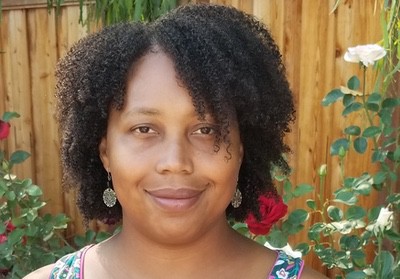
Danielle Burnette
Fiction
Danielle Burnette—an engineer by day, a writer by night—lives in northern California. Her short fiction has appeared in Moon City Review, The Nassau Review, The Lindenwood Review, and elsewhere. Visit her at www.danielleburnette.com.
Popcorn
On the outside of the bulky Popalicious! box, a carnivalesque machine shoots sunny popcorn into the grinning mouths of a photogenic family. They remind Noah of surfacing carp—their zealous leapfrogging to catch the buttery treats. He used to love hand-feeding popcorn to the carp at the family lakeside cabin upstate—feels like more than a lifetime ago. He doublechecks the shipping label to confirm that it was his father who sent the popper.
Junior toddles over to the box. He slaps it, bites it, then looks up with hopefulness. “Popcorn?” he asks Noah.
“Maybe it’s a peace offering,” Kenzie says, fingering one of many holes in her raggedy college sweatshirt. She favors it whenever there’s a terminal patient in the children’s ward, like she’s turned her battered soul inside out.
She is too tender right now, he thinks. “He’s got to know this won’t fit in our kitchen. We don’t even fit in there.”
“I bet he’s forgotten how small our apartment is.”
“There must be more to this. Why couldn’t he just bring it by?”
“Because then he’d have to apologize.” Kenzie’s face tightens as she watches Junior’s buoyant zigzag around the room. “Maybe we should at least open it. Give it a try.”
Noah’s father has only seen Junior through pictures. Noah mails them weekly on the mornings he takes his son to daycare, when Kenzie works her early shift and can’t question this breach of solidarity. Before Junior could walk, the pictures always included Kenzie, as if to say, look at my beautiful biracial family, look at everything you’ve turned your back on. After a disheartening year of no response, the pictures became less instigative, more father and son, more look, Dad, he has your dimples.
What Noah longs for is a photo of his father and Junior at the lake, contented and feeding carp. He dares to hope his behind-the-scenes bait has worked. “Maybe the popper won’t be nearly as big as the box, and we can find a place for it.”
Kenzie slices the packaging tape, and inside the box is a tangle of gas masks with a note that reads: “They are saying bioterrorism is on the rise. Stay safe and keep the pics coming.”
Junior frowns at the masks. “Where popcorn?”
“I don’t know,” Noah says.
“You went behind my back.” Her voice is tiny and wounded as she rips two sweatshirt holes into one.
“He’s my father,” he replies with a defensive edge, “and a minute ago you wanted to ‘give it a try.’”
“Together. I meant, together. And now look what you’ve done.”
“I don’t see what’s so bad,” Noah says. “At least we’re almost talking again.”
Then Kenzie lifts up the masks—one big, one small—and Noah realizes she’s been erased once again. She throws them back into the box as tears flood her face. “I really wish things were different. Why did he have to put them in a popcorn box?”
Noah swallows hard and thinks, to reel us in for the kill. “I’m sorry.”
He looks at the frenzied family on the box, remembers how his father hooked his fingers in the carp’s desperate, gaping mouths and yanked them from the lake. “Isn’t this cruel? Tricking them like this?” Noah asked once in a flash of teenage conscience.
“Beasts have no feelings. That’s why they’re meant to serve.”
“You mean, because they’re animals?” Noah said.
“Some people, too.”
Back then, all he’d wanted was assurance that he could eat dinner without guilt. He’d skated over the full meaning of his father’s words. Just as he’d ignored the reality of who his father was now.
“I’ll fix this,” Noah promises, but Kenzie is already fleeing with their son to the farthest corner of the apartment, and her indignation leaves him unmoored. For a brief moment, he hates her, hates his father, hates the untraversable ocean they’ve created between them. He starts to trash the masks, then considers calling and berating his father.
But on his cell phone, he sees a family selfie—his wife and son pressing their smiling faces against his—and prints the photo. With scissors, he separates their faces and crumples his own into the trash. Then he tapes Junior’s image in an eye of the small gas mask and does the same with Kenzie’s image in the larger one. They will be the last pictures he mails, the last time he surfaces for his father.
“ This story came together like a puzzle over many months. It wasn't until I stumbled across a video of carp eating popcorn that I could see the full picture of what I had hoped to piece together. ”
